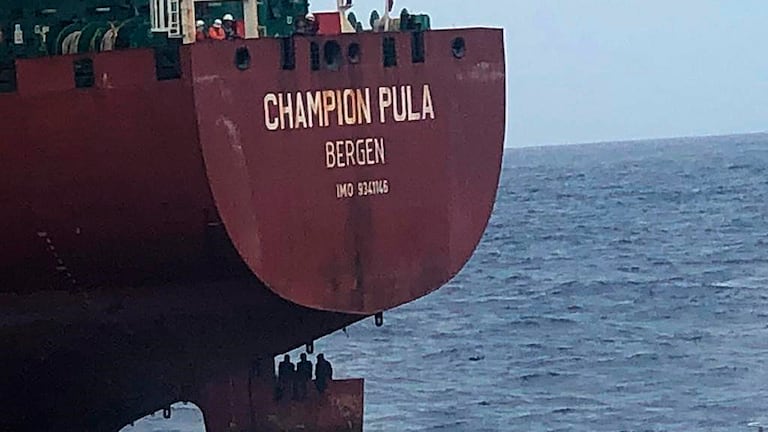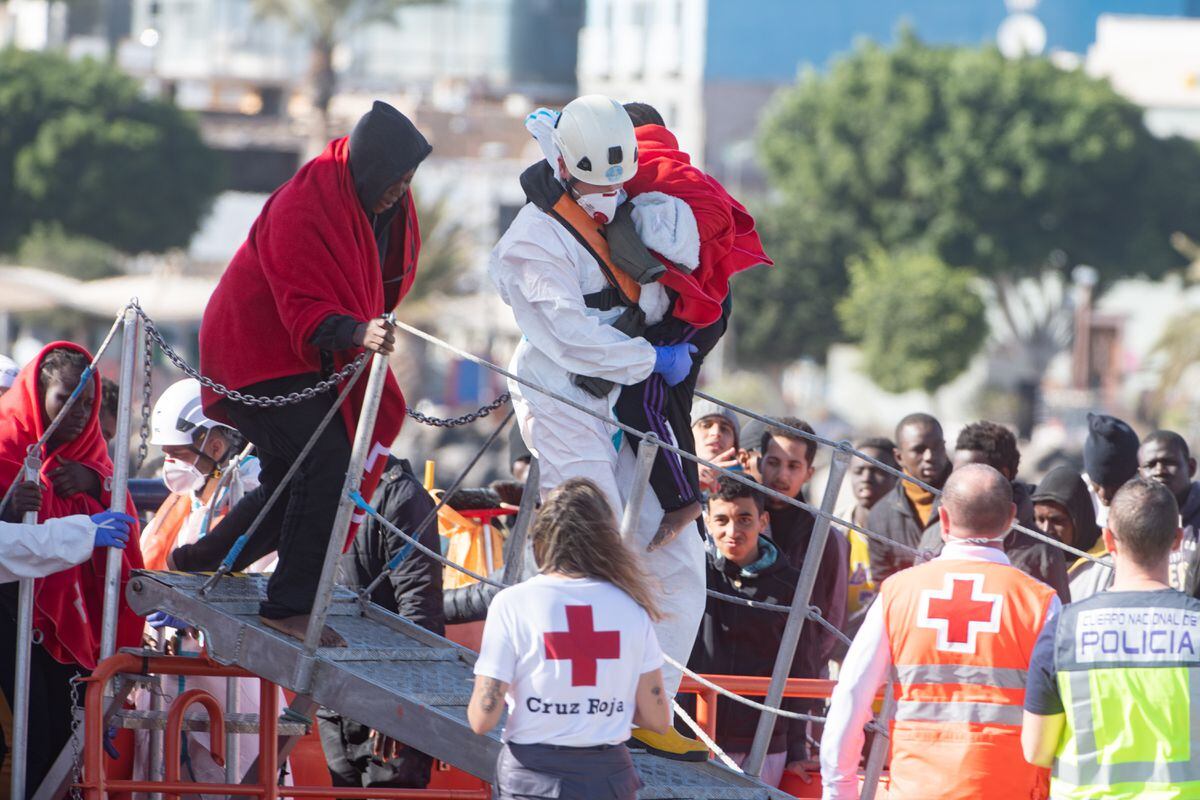Three migrants perched on the rudder blade of a cargo ship on October 6.
It was early morning when little Prince, the fictitious name of a 14-year-old Nigerian boy, heard three men planning in the port of Lagos how they would get on a freighter to reach Spain.
Hidden, he followed their steps to the ship and saw how they took a canoe to reach the ship and with a ladder they climbed to the small space at the stern where the rudder blade is located.
He didn't think twice: he imitated the stowaways, got into the water and climbed into the hole.
The boy thus embarked on a journey aboard the
Ocean Princess I
, a 183-meter-long monster that plows through the seas loaded with up to 50,000 tons of fuel.
He thought that his trip would only last a few hours, perhaps a day, but it took him 15 days, stopping at the port of Lomé, the capital of Togo.
He arrived in Las Palmas de Gran Canaria on November 23.
The journey, in that gap of about two square meters on the blade that directs the ship's course, was terrible.
His companions spent much of their time fighting: they had room to sit, but they could only lie down and sleep in turns.
A blow to the sea or an oversight could lead to certain death in the ocean.
“I was very cold, I was very scared, I thought I was going to die.
We had no food and I used the ladder to catch sea water with my hands and be able to drink ”, says the teenager through a video call from the juvenile center where he is now quarantined.
In the last four months, a score of people have been rescued trying to reach the Canary Islands by this route.
It is impossible to know how many have died on the way.
After ten days of travel, weakened and without land in sight, the situation was untenable.
Prince says that the adults seriously considered jumping into the sea and swimming to nowhere.
“We had a hammer and we were hitting the hull of the ship to get the crew to get us out of there.
Sure they heard us, but no one answered us, ”he recalls.
“The hammer thing is like life insurance.
A ship of those has thousands of noises, if you scream nobody hears you and hitting the plate is the only way to alert the crew.
In one of the rescues, it was the captain himself who gave the warning in port after hearing the blows, ”explains the chief inspector of the Police of the port of Las Palmas de Gran Canaria, Manuel Rodríguez.
Sleeping in shifts
This port, a stopover for the large freighters that leave the African coast for northern Europe, has always received stowaways, but this extreme form of emigration to the archipelago, usually anecdotal, has skyrocketed in 2020. These are not large numbers - especially in comparison with the migratory flow of 20,000 people who have arrived this year on the islands in boats — but its frequency has surprised the authorities who warn of the enormous risk of this route.
In just four months Salvamento Marítimo has had to intervene five times to remove 20 people from the helm of huge freighters.
Last year, none.
“They tend to go up when the ships are empty because the hull is less submerged.
Tankers normally go up in ballast [unloaded] towards Europe and come down loaded with the refined fuel.
It is a dangerous adventure that often ends badly, ”says the head of the Las Palmas Salvage Coordination Center, Roberto Bastarreche.
Those rescued are, for the most part, very young Nigerians who hide mostly in fuel tankers with the flags of Liberia, Greece or even the Marshall Islands.
Prince has been the only minor.
The trip requires you to be seated and some have woven a kind of hammock with ropes that they can tie and rest.
Without that hammock, you have to agree times to sleep and hold on to each other so as not to fall.
"It is very dangerous, if you fall asleep or there is a sea surge, you fall or hit the propeller," explains Inspector Rodríguez.
According to their records, in addition to those rescued in the helm boxes, this year another 13 stowaways have arrived in holds, containers or inside ships.
Despair and more vigilance
The reason for assuming such a risky trip is the same one that pushes hundreds of emigrants to cross routes as dangerous as the one in the Canary Islands in overloaded canoes: despair and vigilance in other ways.
“The captains and owners of the boats have reinforced security to prevent stowaways from getting on their boats.
And upon reaching certain ports such as Lagos or Conakry, these creatures are forced to seek other systems.
They tend to get on when the boat sets sail, thanks to a small boat that is placed behind and that helps them to climb ”, explains Rodríguez.
The shipping companies, according to the agent, are already taking measurements and placing sheets in this hole.
The regulations that stowaways are subject to is different from those that apply to irregular immigrants arriving by boat.
After the rescue, if necessary, and the medical attention, the occupants are the responsibility of the captain of the ship and he must inform each port to which he is going that he is traveling with stowaways on board.
In these cases, it is the ship's consignee who finances all the expenses of food, accommodation, interpreter or assistance and who has to assume the repatriation of the clandestine passenger to the country of origin.
The Police, as happened with Prince, can order their disembarkation and allow them to stay ashore, if they believe that the stowaway may be subjected to inhuman or degrading treatment on board or if they are vulnerable profiles such as asylum seekers, minors or suffer A serious illness.
Prince, who delights his caregivers at the center, seems more mature than boys his age and is generous and serious during the interview.
He says that he finished high school in Lagos and that his family could not afford his studies.
"I wanted a better life," he says.
He left without notifying his mother or his older sister, his references, and did not say goodbye to his two younger brothers.
"If I had warned them they would never have let me come," he says.
The first day he slept and ate properly after his rescue, he felt "victorious" after so many days of hardship.
You already have plans.
He wants to be a lawyer.



/cloudfront-eu-central-1.images.arcpublishing.com/prisa/BOQSH7PVIJAPNOGFOH7TSNBODY.jpg)







/cloudfront-eu-central-1.images.arcpublishing.com/prisa/KMEYMJKESBAZBE4MRBAM4TGHIQ.jpg)



